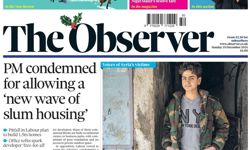Jerry Wright, the chief executive of ABC, often finds himself the custodian of some of the best-kept publishing secrets. When a group plans a major initiative, they usually have to get Jerry on side first.
Long before the London Evening Standard told anyone else in the market about its big idea, they came to the ABC.
“Nobody else knows but we are going to go free. Can you set up systems that will allow us to claim this (distribution) with confidence and will give the buyers confidence”, Wright recalls of the original approach.
It’s not quite so straightforward as tracking the sales of paid-for titles but ABC can follow the paper trail left by free newspapers – assessing the distribution dockets and distribution points and keeping tabs on the copies which come back.
Just to be sure, ABC also employs agents to carry out “reality testing” to ensure that copies really are being handed out at the locations claimed.
“You can’t turn up and say I’ve given away 50,000 free this month, that’s OK isn’t it? No. You have to have systems pre-authorised,” says Wright, the former marketing director of Birds Eye who has been running ABC for the past two years.
So, obviously he will know whether the Independent is planning to move to free distribution or not?
Turning a little cagey, Wright insists he genuinely doesn’t know, although of course everyone expects that the new Russian owners must be looking at a wide range of options for the future of the Independent titles.
That probably means that there are at least no immediate plans to go free, otherwise the ABC chief executive would be considerably more circumspect.
He is more forthcoming about online charging for the Times and Sunday Times. He will have the precise numbers and will know whether initial, informal estimates of only around 15,000 subscribers are true or not.
But although ABC will continue auditing the Times subscription numbers, News International is entirely within its rights to suspend publication for at least the first three months.
With print titles there is no such option. If the numbers are audited, they have to be published. It’s different with digital. Publishers can opt not to publish, particularly in the early days of a new venture, when numbers can be small and fragmentary.
“We will see what the numbers are and we will take a view on it later. At some point they are going to have to make a statement. What’s my proposition? What’s my pitch to advertisers and other people,” Wright explains.
A numbers game
Jerry Wright decided to leave Unilever two years ago after a 25-year career because of the sale of Birds Eye to the private equity sector and the notion that it was time for a change of direction. He had also run Unilever’s media and planning buying group.
“I liked the numbers - it was numbers driven – and I liked the quantitative analysis and I got very interested in accountability and ROI (return on investment),” says Wright.
It wasn’t such a stretch from that to succeeding Chris Boyd as chief executive at ABC, the auditing and certification body founded in 1931 which represents both publishers and the advertising community.
When it was originally created by ISBA, the aim was to end an obvious abuse – newspaper publishers making circulation claims that would have meant that every man, woman and child in the country would have been reading five newspapers a day.
Now the disputes are more likely to be over whether airlines had actually paid a sum – however nominal – to the publishers to count as bulk sales under the rules rather than receiving the copies for free.
With a staff of 100 and annual revenues of £6 million to £7 million, the Berkhamsted-based organisation officially qualifies as a “medium-sized enterprise”.
“It was in rude health when I arrived but I think what was clear was that it needed to change and evolve more quickly in response to what was going on in the outside, the products and services offered and the way it was organised and set up,” says Wright.
More digital representation
The old Council of the ABC had 33 members composed entirely of people with print backgrounds.
“We have now halved the number of directors and within that number, 25 per cent represent digital,” says Wright. They include Tim Brooks, managing director of Guardian Newspapers, Lee Baker, chief executive of the Association of Online Publishers and Helen Evans, a senior digital marketer at Lloyds TSB.
“We are just now agreeing our new digital strategy. A year ago, with the old Council, we couldn’t really have had a discussion that could have shaped and driven that,” says Wright.
On the print side of the fence, it was possible, with a bit of diplomacy, to persuade nine of the top ten magazine publishers, accounting for 200 top titles, to voluntarily publish issue-by-issue data.
They had been worried that the ad agencies would use the more detailed numbers to “beat up” the publishers and force rates down.
“Publisher were saying they were concerned what agencies would do and agencies were saying we don’t trust publishers because they won’t show us the numbers. When both of them showed each the numbers the problem went away,” said Wright who was obviously well versed in how to get things done by consensus from his days working in a large organisation like Unilever.
Measuring engagement
One key facet of the emerging digital strategy is moving on from counting the number of unique eye-balls looking at a website to include not just time spent but the quality of the relationship.
“Until now, people have wanted measures of traffic and now they want measures of engagement,” Wright explains.
Increasingly in the digital arena, the ABC aims to offer “a stamp of trust” not just for the data but for the way people do things – how advertising is sold and traded.
ABC is now auditing the process by which smaller websites sell their advertising through an aggregator - the Internet Advertising Sales House - to ensure that “ads for female personal care don’t end up on US guns and fight sites.”
The ABC’s work as an industry regulator in digital has expanded into the area of behavioural targeting. Seven of the largest players, including Google and Yahoo have signed up to have their privacy policies audited.
“ABC isn’t just about certifying data any more. It will continue to do that but it’s also about certifying processes - the way people do things – which in the digital world may be more valuable. That’s one of the things we are articulating and really driving forward in the digital strategy,” Wright explains over a coffee in his Berkhamsted office.
It has helped that senior ABC executive Richard Foan was into digital internally as early as 1996. Naturally, in those days digital was set up separately as ABC Electronic.
The two streams of information are now at least contained in a single database but further integration is now on the cards.
“It is something that we are clearly going to have to deal with because it doesn’t make any sense to have two brands in a multi-media, multi-platform world. Things are moving in the undergrowth on that one,” promises Wright.
Circulation vs Readership
Developments might start to speed up in the undergrowth as a result of an announcement in late July from old “rivals” the National Readership Survey. NRS appointed research specialist RSMB and UKOM/Nielsen to conduct “a test fusion” of online audience data with NRS readership data. Results should be available early next year and then the body will decide whether to make the “fusion” a permanent feature of the survey.
Relations with the NRS, run by Mike Ironside, have become more cordial in recent years. The two organisations use the same public relations company, publish some joint data and are now putting together joint training packages for the industry which demonstrate how to use circulation and readership in an integrated way.
Full integration, discussed three years ago, does not however seem to be on the agenda at the moment mainly because the methodologies of the two bodies are so different – one a high quality panel based survey and the other a census-based audit organisation.
Trying to offer joint numbers from such different sources would, Wright believes, be potentially very dangerous because it could involve “smoothing numbers – fiddle is the wrong word – or changing numbers away from what they really are, something that would undermine the credibility of two independent sources”.
Wright believes that there is a more interesting question.
“As the whole world moves towards digital convergence, do we need BARB, RAJAR, NRS or should there be one overall survey. You’ve got Touchpionts3 and that is moving towards an integrated approach to data,” says Wright.
“A singe body, that’s really a question for the industry and the industry bodies concerned to come to a view on. One day I think it will happen as increasingly TV gets delivered to PCs and mobile phones and you need a holistic approach,” he adds.
Such a concept is still “a headscratcher job” – a minimum of five years off. Even in the US they are nowhere near anything like that.
In the meantime, the ABC chief executive says he is determined to increase the organisation’s ability to innovate and try to stay “on the top of the wave and surf with it” wherever it goes.
But ABC has absolutely no intention of expanding into stocking the Bat Man or gorilla outfits they are frequently asked for.
Instead the inquirers are politely directed to the ABC Costume Hire supplier – absolutely no connection - which just happens to be next door on Berkhamsted High Street.










